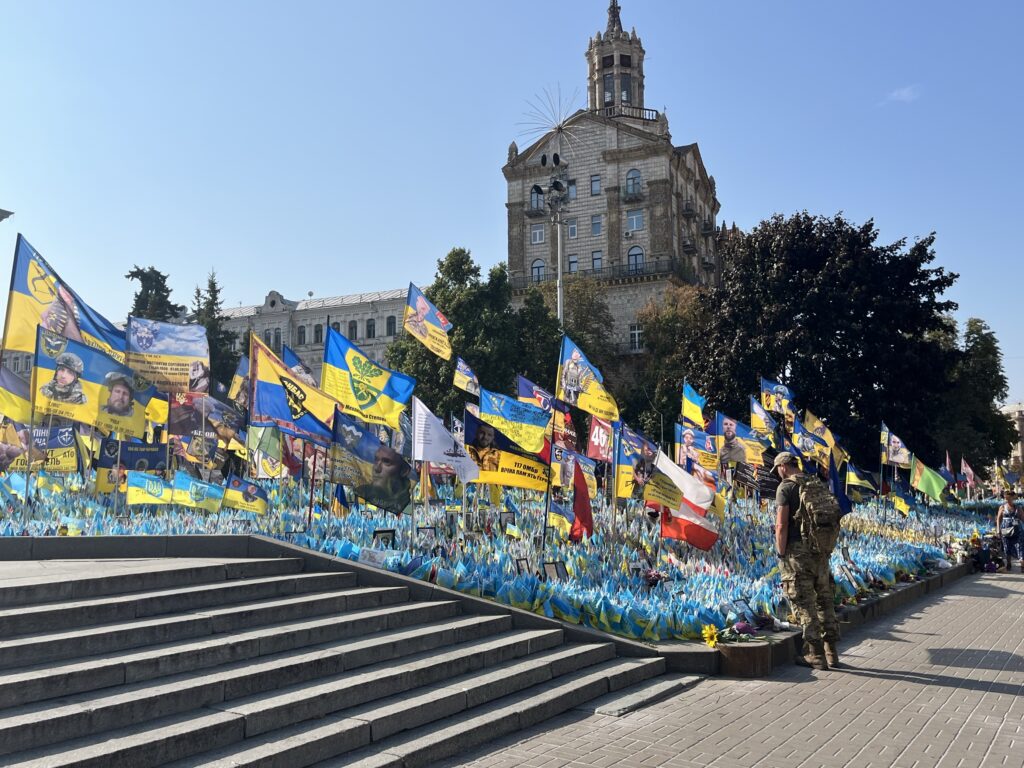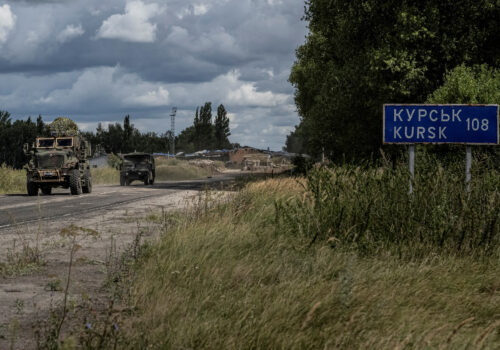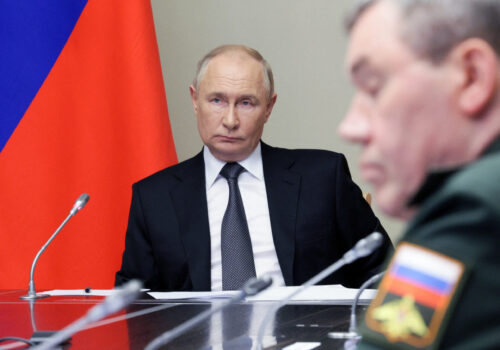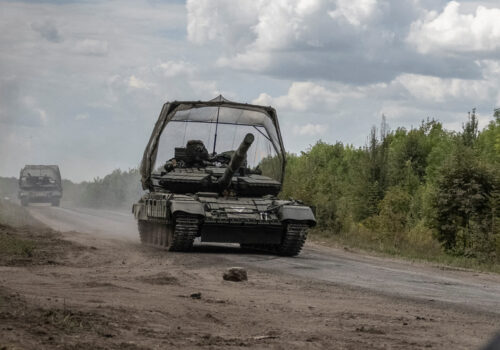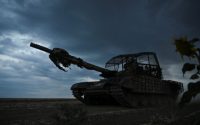Dispatch from Kyiv: How Ukraine’s incursion into Russia has changed the war
KYIV—This week, the Atlantic Council’s Eurasia Center took sixteen of its congressional fellows, Senate and House staff members from both parties, on a whirlwind trip to Warsaw and Kyiv. We rode the train from Warsaw to Kyiv overnight and spent two full days meeting with Ukrainian government officials responsible for security, foreign policy, the economy, and energy. We also met with opposition leaders, including former President Petro Poroshenko and former prime ministers Volodymyr Groysman and Arseniy Yatsenyuk, and civil society leaders. The realities of the conflict were immediately apparent. We arrived in Kyiv the day after one of Moscow’s largest air attacks on Ukraine since the war began, and we spent much of our first night in Kyiv in our hotel’s bomb shelter.
Without a doubt, our chief impression was the energy and renewed confidence Ukraine’s bold strike into Russia has provided the country’s leadership and people. They see the seizure of more than 460 square miles of Russian territory and the capture of hundreds of Russian soldiers as a clear victory, one that has changed the international conversation from a focus on peace talks or a ceasefire in place largely on Kremlin terms; they recognize that Russian President Vladimir Putin’s notion of a ceasefire in place is now much less attractive to the Kremlin.
In other words, Putin now might have reason to give up occupied Ukrainian territory as part of a ceasefire agreement. They are encouraged by the disarray in Moscow as the Kremlin downplays the significance of losing control over Russian territory; as Russians fleeing from areas Ukraine has taken fulminate about an uncaring and incompetent government; and as public television commentators, usually careful to toe the Kremlin line, criticize the government for lying about the situation. And perhaps most important of all, Ukrainians see themselves as capable of determining their own fate and not simply the objects of irresistible Russian aggression and political debates in the West about whether Ukraine should continue to receive military and economic aid.
If Ukrainian forces see additional opportunities, they will seize them.
This sense of pride and confidence was all the more remarkable because it had not been dulled by the massive bombing the city (and country) endured just one day before our arrival. Since March, Russia’s air campaign against Ukraine’s energy infrastructure has destroyed about nine gigawatts of Ukraine’s energy supply, which has led to massive energy blackouts. While Kyiv faces fewer outages because it enjoys the protection of Western air defense systems, this week’s strike left parts of the city without electricity for most of each day, and it left most of the city without electricity for at least a few hours.
It’s important, too, that the psychological shot in the arm Ukrainians received from the offensive into Russia has not made them dizzy with success. They clearly understand that the operation in Russia entails risks, and they are taking measures to minimize them. This is evident in their building of fortified positions along and south of the Seim River. This is territory they seem intent on holding for some time with a view to eventual peace talks. This also ensures a position to which Ukrainian forces can retreat as they encounter Russian forces mobilized to stop the Ukrainian advance. This does not mean Ukraine will now just consolidate its gains. If Ukrainian forces see additional opportunities, they will seize them, something that recent advances in the Belgorod and Bryansk oblasts make clear.
The sobriety of our Ukrainian interlocutors was also evident as they did not sugarcoat the situation in the Donbas. Some analysts, who have consistently underestimated Ukraine’s ability to withstand Moscow’s full-scale invasion, criticized the strike into Russia for using up military units that could have been better deployed to defend the town of Pokrovsk, toward which Russian forces have made grinding and costly gains. While celebrating their gains inside of Russia, our contacts did not deny that the battle for Pokrovsk remained difficult.
But they also believe that the “Russian operation,” as they described it, should finally bury the notion held by senior officials in Washington and Berlin that strong Western support for Ukraine might provoke Putin to use nuclear weapons. With ample justification, our contacts pointed out the numerous ostensible Kremlin red lines that have been crossed—Ukrainian strikes into Crimea, Sweden and Finland joining NATO—without Putin going nuclear. And now Ukrainian forces are in control of a chunk of Russian territory and the Kremlin is downplaying its significance.
A growing chorus of voices in Europe are joining Ukraine’s call for the United States, Germany, and other NATO members to permit the use of their weapons against military and strategic targets in Russia and to arm Ukraine to win this war. This is certainly the smart move for the White House and the German Chancellery to make. US President Joe Biden should also use his last months in office to reach out to Republican leaders in Congress to pass one last aid bill for Ukraine during his administration.
John E. Herbst is senior director of the Atlantic Council’s Eurasia Center and served for thirty-one years as a foreign service officer in the US Department of State, retiring at the rank of career minister. He was US ambassador to Ukraine from 2003 to 2006.
Further reading
Tue, Aug 27, 2024
Putin hopes Belarus border bluff can disrupt Ukraine’s invasion of Russia
UkraineAlert By Peter Dickinson
With his overstretched army struggling to repel Ukraine’s invasion of Russia, Vladimir Putin has pressed Belarusian dictator Alyaksandr Lukashenka to mass troops on the Ukrainian border, but Belarus is unlikely to join the war, writes Peter Dickinson.
Wed, Aug 21, 2024
Invasion? What invasion? Putin is downplaying Ukraine’s Kursk offensive
UkraineAlert By Peter Dickinson
Vladimir Putin’s efforts to downplay Ukraine’s invasion of Russia have severely dented his strongman image and make a mockery of the West’s escalation fears, writes Peter Dickinson.
Tue, Aug 20, 2024
Kursk offensive could help free Ukrainians in Russian captivity
UkraineAlert By Olivia Yanchik
Ukraine’s invasion of Russia’s Kursk Oblast has resulted in the surrender of unprecedented numbers of Russian soldiers, raising hopes of a large-scale prisoner exchange, writes Olivia Yanchik.
Image: Day of Remembrance of the Defenders of Ukraine, August 29, 2024 (Photo by Shelby Magid).
